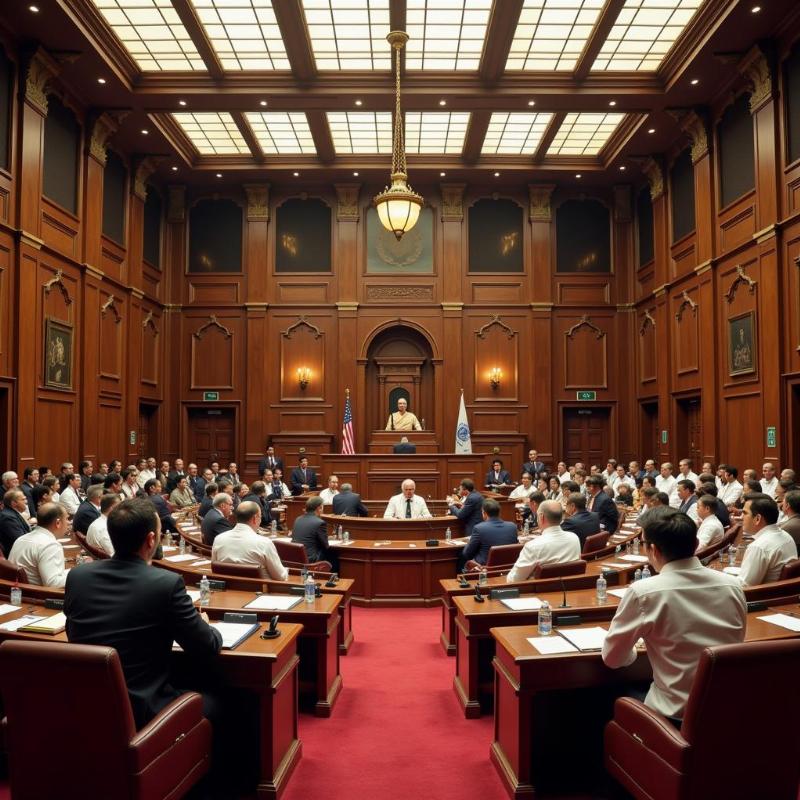The Place of Worship (Special Provisions) Act, 1991, is a crucial piece of legislation in India that aims to maintain the religious character of places of worship as it existed on August 15, 1947. This Act seeks to prevent disputes arising from the conversion of religious places and promote communal harmony. Understanding its provisions is essential for anyone interested in India’s legal and social landscape. This article delves into the key aspects of the Act, exploring its implications and significance in contemporary India.
Key Provisions of the Place of Worship (Special Provisions) Act, 1991
The Act prohibits the conversion of any place of worship from one religion to another. It declares that the religious character of a place of worship shall continue to be the same as it existed on August 15, 1947. Any suit, appeal, or other proceeding relating to the conversion of the religious character of a place of worship existing on August 15, 1947, pending before any court, shall abate. However, legal proceedings related to the conversion of a place of worship after that date are not barred.
 Parliament Discussion on the Place of Worship Act, 1991
Parliament Discussion on the Place of Worship Act, 1991
The Act also has certain exceptions. It does not apply to the Ram Janmabhoomi-Babri Masjid dispute in Ayodhya, which was subject to separate legal proceedings. Additionally, ancient and historical monuments and archaeological sites protected by the Ancient Monuments and Archaeological Sites and Remains Act, 1958 are also exempt.
What prompted the Place of Worship Act, 1991?
The Act was enacted in a socio-political climate marked by increasing communal tensions and disputes over religious sites. The government aimed to prevent further escalation of such conflicts by freezing the status quo of places of worship. The objective was to promote communal harmony and prevent the disturbance of public order by prohibiting the conversion of religious places.
Implications and Significance of the Act
The Place of Worship Act, 1991, has far-reaching implications for India’s legal and social fabric. It reinforces the secular principles enshrined in the Indian Constitution and emphasizes the importance of respecting the religious sentiments of all communities. By preventing the conversion of places of worship, the Act aims to prevent potential flashpoints of communal violence.
Does the Act infringe on religious freedom?
Some critics argue that the Act infringes upon the right to religious freedom by preventing individuals from practicing their faith at a place of their choosing. However, proponents maintain that the Act is essential for maintaining social order and preventing communal strife. It strives to balance individual religious freedom with the larger goal of national integration and peace.
Conclusion
The Place of Worship (Special Provisions) Act, 1991, plays a vital role in safeguarding communal harmony and preventing religious disputes in India. While it has faced criticism, the Act remains a crucial piece of legislation that seeks to maintain the delicate balance between religious freedom and social order. Understanding this Act is crucial for comprehending the complexities of India’s religious and political landscape.
FAQ
- What is the main objective of the Place of Worship (Special Provisions) Act, 1991? The primary aim is to prevent the conversion of any place of worship and maintain its religious character as it existed on August 15, 1947.
- Does the Act apply to all places of worship? No, there are exceptions, most notably the Ram Janmabhoomi-Babri Masjid dispute and ancient monuments protected by other laws.
- Why was the Act enacted? It was enacted to address increasing communal tensions and disputes over religious sites, aiming to promote harmony and prevent violence.
- How does the Act impact religious freedom? While some argue it restricts freedom, proponents believe it’s essential for social order and preventing conflict.
- What is the significance of August 15, 1947, in the context of this Act? This date serves as the cut-off point for determining the religious character of a place of worship.
About PlaTovi
PlaTovi is your trusted partner for exploring incredible India and beyond! We offer comprehensive travel solutions, from curated tour packages and hotel bookings to flight reservations, event planning, and convenient airport transfers. Whether you’re seeking a traditional sightseeing experience, a luxurious resort getaway, or seamless travel arrangements, PlaTovi is here to craft your perfect journey. For personalized assistance and bookings, contact us at [email protected] or call us at +91 22-2517-3581. Let PlaTovi turn your travel dreams into reality!